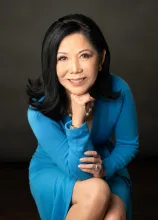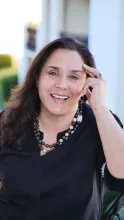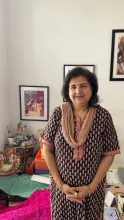Valerie Boey Ramsey was born in New York in 1967. She recollected memories of her upbringing, particularly growing up in a middle-class Chinese home in New York. She shared stories of her family’s Asian lineage. In 1991, Valerie moved to Florida to work for WINK News in Fort Myers. In 2003, TSP Tampa hired her, initially covering state politics in Tallahassee. Valerie left TSP to join FOX 35 in Orlando in 2008. Additionally, Valerie highlighted how she has supported the Asian American community in Central Florida through her reporting.
Thamara Bejarano was born in Caracas, Venezuela in 1978. A daughter of two journalists, Thamara recalled her experience growing up in Caracas, especially in the 1990s. She explained in detail the 1998 election, in which Hugo Chavez gained power, leading to the kleptocracy that continues to plague the nation today. Given that Thamara and her parents worked in media, she highlighted how the Chavez and Nicolas Maduro regimes impacted her family professionally and personally. Thamara recounted a particularly harrowing incident during her time as a professor of Film Studies at the Universidad Central de Venezuela, which ultimately led her to flee the country. Thamara arrived in the United States in 2014, building several important and impressive cultural organizations that highlight different perspectives across the varied cultural landscape of Latin Americans in Orlando, specifically, and other underserved communities in the United States generally. Among these cultural organizations that Thamara emphasized included Open Scene, Prolifica, Latin Festival of Performing Arts, and Open Zine. Lastly, she shared her broader experiences living in Orlando as a Venezuelan woman and entrepreneur, particularly how the city has changed culturally and how the cultural landscape might change in the future.
Jasdeep “Jazzy” Aujla was born in Barking, East London, United Kingdom, in 1990. She emigrated to Central Florida at four years old with her father. Economic difficulties prompted Jasdeep’s parents to leave the UK, while relatives already living in Central Florida facilitated their decision and transition to the Sunshine State. As an Indian immigrant, Jasdeep recalled early challenges acclimating to American culture, from language to aesthetics. She emphasized how the aftermath of 9/11 affected racial views regarding brown people, recounting a personal incident that happened to her while returning home from school. She remembered how, as a teenager, she disassociated from her Indian heritage in an attempt to fit into certain American “clichés,” a concept Jasdeep used constantly throughout her oral history. Jasdeep not only highlighted cultural identity crises throughout moments in her personal life but also connected such instances to larger racial, cultural, and social issues that most immigrants or children of immigrants face when living in America. Additionally, given that she spent her entire life in different parts of the state (resided in Central Florida, graduated college in North Florida, attended law school in South Florida), Jasdeep provided insightful and nuanced observations about Florida generally and what the state has represented for Indians and other ethnic groups since she arrived in 1994.
Surabhi Adesh was born in Bareilly, Uttar Pradesh, India, in 1965. Her father received a position with the Indian High Commission to teach Hindi music and culture in the West Indies and report on the broader conditions of the Indian diaspora in that region. As a result, in 1966, when Surabhi was around a year old, the family moved to Trinidad. In 1967, her father established the Bharatiya Vidya Sansthhaan Institute, also known as the Institute of Indian Knowledge, with a mission to reacquaint the Indian diaspora in Trinidad with Hindi culture through music, philosophy, and history. At eleven years old, Surabhi assisted her father in the Institute, teaching musical classes. In 1981, Surabhi and her family moved to Toronto, Canada, to expand the Institute's reach, highlighting the contributions they made in that region and the similarities and differences encountered while engaging with the Indian community in both areas. Surabhi also discussed her personal experiences through that comparative lens between both places. Financial difficulties prompted Surabhi and her family to relocate from Toronto to Orlando, Florida, in 1999. Upon arrival, Surabhi maintained her father’s legacy of teaching Indian music and knowledge through classes she held mainly at her house. Her involvement with the Asian Cultural Association facilitated this educational endeavor. Surabhi discussed her performances throughout Orlando, her teaching methods, her impact on the Indian community in Orlando, and what she learned about Indians and Orlando through her teaching career. Additionally, she highlighted the significance of maintaining Indian culture, both generally and specifically, through her pedagogy, especially in the face of what she called a “dilution” of culture generationally. Lastly, she shared her broader observations about Florida, including the state’s continuities and changes over the past quarter-century, as well as the challenges it faces in the contemporary moment (c. 2025).
Cassadaga. Established in 1894, Cassadaga is one of Florida's most unique historic communities. Known around the world as a center for Spiritualism, the residents of Cassadaga believe that life continues after physical death, and that mediums can be used to communicate with the Spirit World.
Fort Christmas was built on December 25, 1837, during the Second Seminole War. A replica of the fort is at Fort Christmas Historical Park in east Orange County, along with a collection of pioneer homes and buildings.
Plantations in Florida were part of an agrarian society that depended upon the labor of enslaved people. Remnants of Florida's plantation culture can still be seen today at places including Goodwood Museum and Gardens and the Grove Museum in Tallahassee, the Kingsley Plantation on Fort George Island in Duval County, and at Bulow Plantation Ruins Historic State Park in Flagler County.
Discovering A.S.J. Allen. In 1904, the African American community leader A.S.J. Allen was killed by a white neighbor over a property border dispute. Allen's great-grandson Alonzo Felder has researched his productive life and tragic death.
Jonathan Dickinson's Journal. Newly discovered documents from 1696 add to familiar accounts of Jonathan Dickinson's shipwreck and survival in Florida.
Memories of Palatka. By the mid-1800s, the historic town of Palatka was a transportation hub for steamboat traffic. In the early 20th century, it became a battleground against the Ku Klux Klan. In 1933, Ravine Gardens State Park became a WPA project. Beginning in the 1970s, The Florida School of the Arts provided performers for "Cross and Sword," the official state play of Florida.




